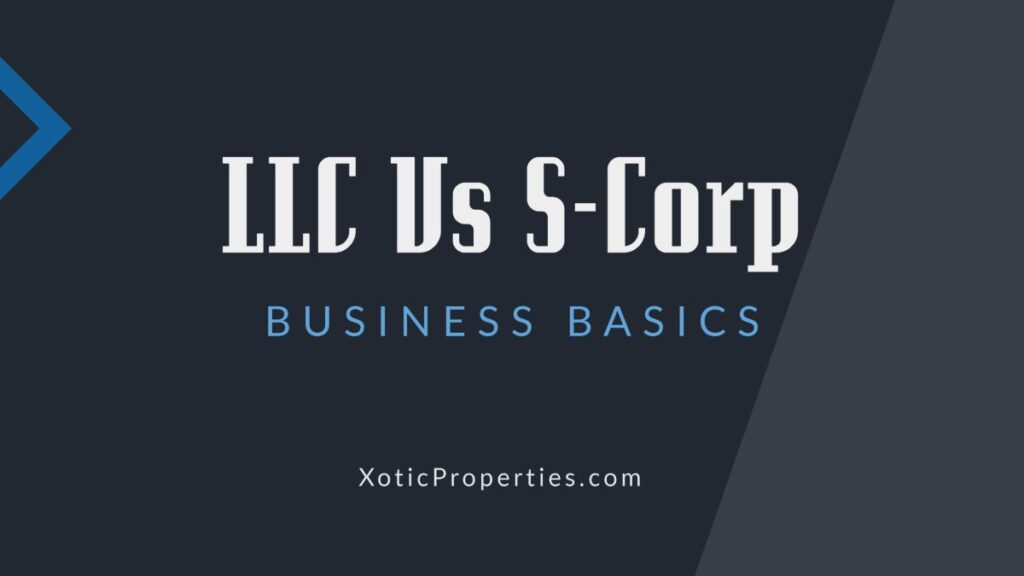LLC Vs S-Corp: Which is Better for your Business?

If you are considering starting a business, one of the first decisions you’ll have to make is what type of legal structure your business should take. This decision can have significant tax and liability implications. So it’s vital to get this part of your business plan right from the start.
Both LLCs and S-Corp are popular forms of business structures. Each has its own unique set of advantages and disadvantages that can affect your business in different ways.
In our previous post, we discussed the difference between an LLC and a Corporation. In this post, we will discuss the differences and how to choose between forming an LLC or a S-Corp.
What is an LLC?
An LLC (Limited Liability Company) is one of the most popular business entities that provides limited liability to its owners. It combines both the pass-through taxation of a partnership with the limited liability of a corporation.
An LLC provides owners of the company with protection from being held personally liable for business-related debts and obligations. This means that if the company gets sued or goes bankrupt, only the assets of the business are at risk. The owners of the company will not be held personally liable for any business debt or obligation, so their personal assets are protected from such risks.

In addition to providing limited liability, an LLC also provides pass-through taxation like a partnership and sole proprietorship. This means the LLC does not pay taxes on its income. Instead, the individual members or owners of the business are taxed directly for their share of the profits from the business.
What is a S-Corporation?

A US S-Corporation, or an “S-Corp,” is a specific type of corporation under the US tax code that provides its owners with several benefits over traditional corporations. The most notable benefit for an owner of an S-Corp is that they are not subject to double taxation.
An S-corp is not a business entity like an LLC, sole proprietorship, partnership or corporation. Rather, it is a tax designation applied to certain corporations which make them pass through entities. This means that the corporation itself does not pay taxes, and all income or loss passes through to shareholders for their individual reporting.
Differences between an LLC and a S-Corp

Taxation
Mainly, an LLC and a S-Corp are taxed differently. An LLC is not recognized as a separate tax entity by the federal government; instead it passes all profits directly to owners of the business who then report them on their individual income taxes.
On the other hand, an S-Corp is recognized as a separate taxable entity by the federal government. This means that an S-Corp can file taxes on its own for any profits it has made throughout the year, which are then passed along to shareholders in proportion with their shares within the company.
Management Structure
LLCs, unlike S-Corps, allow members to have a great deal of control over company decisions. In an LLC structure, owners manage the business directly and any profits they receive from the company are taxed as personal income on their individual taxes.
In an S-Corp however, shareholders elect a board of directors who then hire corporate officers to oversee daily operations of the company. In this structure, shareholders have limited liability and are only responsible for taxes on their shares of corporate income.
Capital Contributions
Both S-Corps and LLCs require initial capital or investments called “capital contributions.” However, the way they are taxed is different.
An LLC does not have to pay taxes on capital contribution until it distributes earnings as dividends whereas an S-Corp must distribute all profits first before shareholders can make their own tax election on how to receive the profits (or losses).
Shareholder structure
In an S-Corp, the number of shareholders a company can have is limited to 100 people. In addition, shareholders must be US citizens or permanent residents and each shareholder can only hold a maximum of 30 percent ownership in the company.
An LLC on the other hand, has no limit or restrictions to who can be a shareholder and how much of the company they own.
Subsidiary Restrictions
An S-Corp is not allowed to have subsidiaries. If an S-Corp wants to form a subsidiary, then it must pay the federal government taxes on any profits it receives from the subsidiary.
An LLC, however, can have subsidiaries without having to pay any taxes on their earnings or distributions because they are considered pass-through entities.
Advantages and Disadvantages of Forming an LLC

Advantages of Forming an LLC
No double taxation : An LLC offers several benefits that make it a smart choice for entrepreneurs. For example, one of the main advantage is that LLCs are not subject to double taxation. This means that the profits of your business will be taxed only once, unlike traditional corporations which face taxes on both corporate income and shareholder dividends.
Flexibility: You can either make an operating agreement or let the default rules under state law apply. This means that LLCs are flexible and you can customize them to meet your needs as a business owner.
Easy to Form: It is easier to form an LLC compared to other types of entities and they generally require less paperwork. Also, LLCs are under the jurisdiction of state law, so the process of forming an LLC depends on the state in which it is being filed.
Lower Startup Costs: It is easy to set up an LLC and it requires fewer legal requirements than other business types. This means you will have lower startup costs compared to other entities such as corporations or partnerships
Disadvantages of Forming an LLC
Restricted membership: An LLC does not allow for broad-based public ownership. In fact, an LLC can only be owned by a few members or even just one person.
No stocks: An LLC is not a publicly traded business entity. Therefore, it does not offer the benefits that shareholders receive such as the ability to purchase and trade shares in this type of company.
Advantages and Disadvantages of Forming a S-Corp

Advantages of Forming a S-Corp
Personal liability protection: A shareholder of an S-Corp is not personally liable for debts and obligations incurred by the company. In other words, you will be shielded from personal liability as long as you do not provide guarantees or co-sign any documents that may leave your business responsible should something go wrong.
Creditor protection: Forming an S-Corp provides its owners with creditor protection. As mentioned before, in LLCs you may be personally liable for business debts and obligations up to the amount of your investment, whereas an S-Corp protects you from this since the business and its shareholders are treated as two separate entities.
No double taxation: An S-Corp is a pass-through entity, which means that it does not face double taxation. This benefit can be very appealing to business owners who want their profits taxed only once and then divvied out as dividends.
Disadvantages of Forming an S-Corp
Limited liability protection: Unlike an LLC, which offers its members limited liability protection, this type of entity does not protect shareholders from personal liability for company debt.
Restricted ownership: Only certain types of businesses are eligible for the S-Corp designation, including domestic corporations that are not C-Corps.
LLC or S-Corp: Which One Should You Choose?
Now that you know what each type of business structure entails, deciding between forming a limited liability company or a S-Corporation will be much easier for you. Ultimately, the choice will depend on your individual needs and preferences.
For instance, if you are looking for more flexibility in how you operate your business or need to be able to raise capital easily, an LLC may be ideal for you. On the other hand, if you want a company that is taxed less than traditional corporations but still provides you with protection from personal liability, then an S Corp may be the way to go.
The best thing you can do is consider each of your options and speak with a business lawyer who specializes in these types of entities before making any decisions. This will help ensure that you make the right choice for your individual situation and save money down the line when it comes to filing and taxes.
FAQs
Is an LLC or S-Corp better for entrepreneurs?
An LLC and an S-Corp are both great options for entrepreneurs. However, they each come with different benefits depending on your business needs.
What is the difference between an LLC and an S-Corp?
The main difference between an LLC and an S-Corp is their tax status. An LLC can be taxed as a disregarded entity or partnership, while the latter gets taxed like a corporation.
What are some of the pros and cons of starting my business as either one?
An LLC may face double taxation when its profits are distributed to shareholders but does not require annual meetings or record keeping. Meanwhile, an S-Corp does not have to pay the self-employment tax on its shareholders’ income like LLCs do and provides more protection for them in terms of liability.
Conclusion: When you start a company, the decisions that you make can be crucial. One of those important decisions is whether your business should form an LLC or S corp; and if so which one? Let’s take a look at what each type entails and see how it will affect the way your business operates. Once we understand them better, we can help determine which option would work best for your startup company in Orange County, CA. Contact us today to get started!
